They Saved Civilization
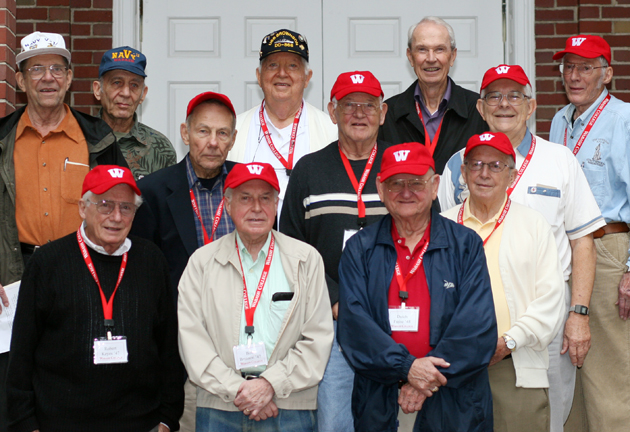
Legends came to life in Detchon International Hall when alumni from Wabash’s World War II years returned to campus in September.
Dave Atchley ’46 recalled standing in Little Giant Stadium in 1943 and staring up at the clear night sky as a student in Professor Verne Robinson’s class in celestial navigation.
"We set up the scopes, and I was amazed at how many other faculty members were there that night," Atchley told his fellow World War II veterans, all Wabash men from the days when President Frank Sparks opened the College to the Navy’s V-12 program. "All the professors seemed to know something about astronomy or the constellations. It was my introduction to what a learning community could be."
Bill Cargo ’46 recalled Coach Pete Vaughn’s response when a newspaper reporter asked him about the Little Giants’ effort in a 0-0 tie against a heavily favored Illinois football team.
"I think our men played tougher than I thought they could," the stoic Vaughn told the reporter.
"But there were tears in his eyes," Cargo recalled, with tears of his own.
Cargo also remembered Classics professor Jack Charles’ class on Naval Warfare.
"We learned a lot about Phoenician battle tactics," Cargo laughed.
"I never knew a better teacher than Jack Charles," Atchley added.
Gus Manoff ’48 and Bob Branson ’48 had known each other in high school, but they become roommates at Wabash, along with Bob Keyes ’48, and a friendship developed between all three that has endured for six decades.
Chuck Gudbranson ’46 recalled that he and five friends had planned to enlist before Gudbranson opted for further training through the V-12 program.
"All five of those men never returned from battle," Gudbranson said.
Former Wabash President Andy Ford often proclaimed that the mission of Wabash College is "to save civilization." As new President Pat White noted at the V-12 reunion dinner, these Wabash men did just that.
"Frank Sparks, through the V-12 program, saved this College, and you in those dark and harrowing days of World War II, saved civilization," White told the V-12 alumni. "May all of us who have the honor of teaching and learning at Wabash College respond to your legacy with such courage, vision, fortitude, and heart.
President Pat White leads students in a cheer from the end zone bleachers during the Little Giants’ 23-20 victory over DePauw in the 113th Monon Bell Classic.
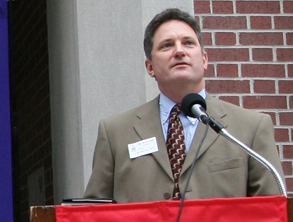 By design
By design
Jim Riddle ’86, architect of the new Psi Chapter house of Phi Gamma Delta, steps to the podium to thank alumni donors, contractors, and the Wabash administration for the opportunity to design the $5 million structure.
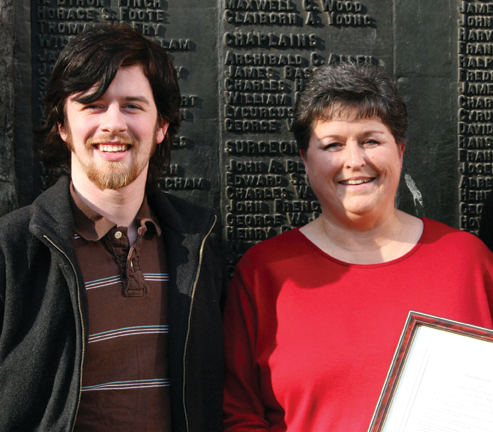 "It is through Terri’s hard work and commitment that our student government and student organizations have remained financially solvent over the years."
"It is through Terri’s hard work and commitment that our student government and student organizations have remained financially solvent over the years."
—Student Senate Vice President Brett Gann ’07, proclaiming the business office’s Terri Fyffe an honorary Wabash student senator.
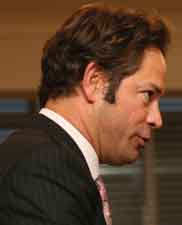 If it wasn’t for John Fischer I would probably be standing here before you in an orange jumpsuit and leg-irons.
If it wasn’t for John Fischer I would probably be standing here before you in an orange jumpsuit and leg-irons.
John took an interest in more than just the student; he took an interest in the person.
For us, the town of Crawfordsville became a cultural Mecca offering some of the world’s most diverse culinary selections, some of the finest wines, music, art, philosophy. All one had to do was walk through the doors of John Fischer’s house.
I raise my glass to you, John: "O Captain! My Captain!"
—James Dreher ’85, proposing a toast to his mentor and friend at a dinner celebrating the establishment of the John E. Fischer H’70 Fund for Cross Cultural Experiences.
_________________________________________________________________________________
As bad as it is to tell people what they can’t say, it’s much, much worse to tell them what they must believe. That comes from the left, right and the center."
—Greg Lukianoff, president of the Foundation for Individual Rights in Education (FIRE), speaking on campus in November.
The World Bank has spent $136 billion in development and has nothing to show for it. Reform fails because of too much imitation of the United States. They’ve got to restructure the game. Until you understand a society’s history and culture, you cannot change its economy.
—Nobel Laureate Douglass North on campus to deliver the 2006 Benjamin Rogge Lecture
Criticism and care are not incompatible
To think critically, to see the argument in its parts and whole, is not enough. We must also engage the conversation with a conscience that is conscientious about attending to the human being with whom we are in conversation. Nazi Germany prided itself in having the best thinkers in science, literature and the arts, more PhDs and Nobel laureates per capita than any nation in the world. And yet, the absence of conscience about the Jews, the Roma, the homosexuals, thedisabled, the ideologically different made the thinking of that time more than shameful.
—Dean of the College Gary Phillips in a Chapel Speech entitled "Writing the Wrongs of the World"
 McDonald’s credits you for its Happy Meal and two-lane drive-in innovations. Today, though, we honor you for all you have meant to the city of Boulder and the state of Colorado, which you have strengthened through your active involvement and philanthropy. Wabash hopes to educate its students to think critically, act responsibly, lead effectively, and live humanely, characteristics you’ve modeled every day of your life.
McDonald’s credits you for its Happy Meal and two-lane drive-in innovations. Today, though, we honor you for all you have meant to the city of Boulder and the state of Colorado, which you have strengthened through your active involvement and philanthropy. Wabash hopes to educate its students to think critically, act responsibly, lead effectively, and live humanely, characteristics you’ve modeled every day of your life.
—from the citation read at Homecoming Chapel to Bob Charles ’59, recipient of the 2006 James Urbaska Civic Service Award.
"Surely, I say to myself, he’s just late getting back from lunch. I got here early. Surely he’ll be back in a few minutes. I’ll wait here in the Bookstore, just a little while longer."
—Professor of Religion David Blix, from his eulogy of classmate and longtime Wabash bookstore manager Mike Bachner ’70, at a service in the Chapel attended by more than 500 from the Wabash and Crawfordsville communities.
Melting into the floor boards
I was struck by the poise of all four students who were under fire. I would have melted into the floor boards when I was 18. I was just very impressed.
—Honorable William Lawrence, Magistrate for the Southern District of Indiana, commenting on Wabash students participating in the College’s annual Moot Court competition. Senior Jim Stephens (right) won this year’s event, which was judged by 17 alumni attorneys and 8 faculty, including President Pat White.
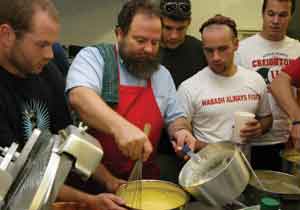
"Robert Van Kirk ’07 may have created the greatest club in
Wabash history," Brock Johnson ’07 mused in an October photoessay for The Bachelor. With increasing numbers of students gobbling up cooking tips from alumni, faculty, staff, and fellow students at the club’s Sunday evening meetings, Johnson has a point. And Van Kirk has a full plate of faculty and alumni guest chefs for the spring semester, too. Good food, great faculty, student, staff, and alumni interaction, and fire—what could be better?!
Pots are back!
Thanks to the writing of Michael Rubino ’94, a student-driven revival of the wearing of freshman pots made the pages of The Christian Science Monitor.
As Rubino wrote in the October 26th edition:
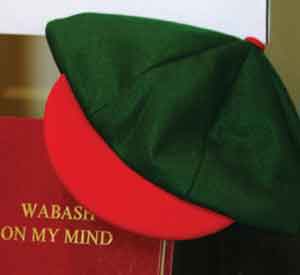
The revival of the beanie was the inspiration of senior Ross Dillard,
who, like many fellow students, had admired his school’s past but felt
removed from it. Through the school bookstore, Dillard made an
initial order of 150 pots, then sold the idea to the fraternities. Through
his efforts, all freshman fraternity pledges are wearing pots, and
some independents, too. The bookstore was cleaned out of the $10
pots in the first two weeks of school this fall and had to restock what
is now the bestselling clothing item in the store.